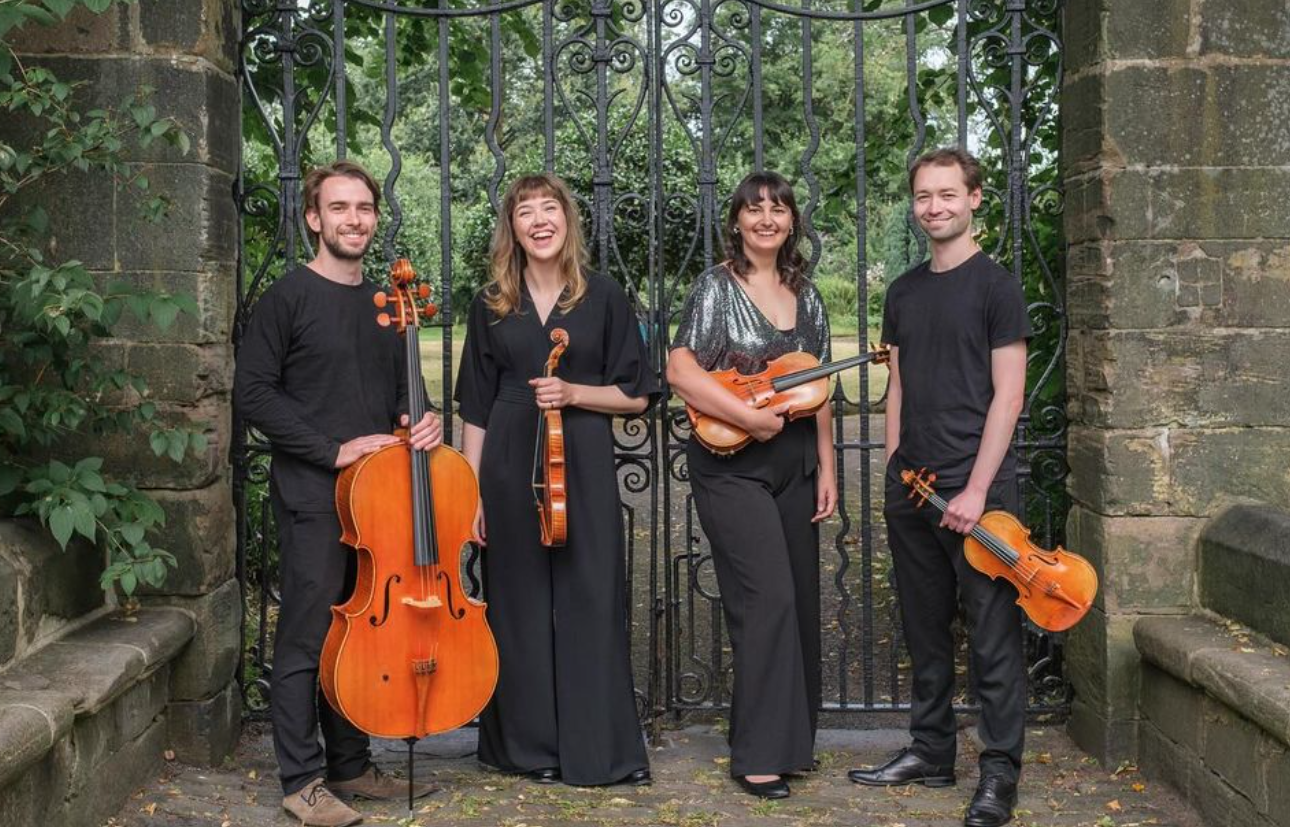A New Music Double Bill presents innovative and spellbinding contemporary classical music

Monday’s Child & Treske Quartet | The International Anthony Burgess Foundation | 15th October 2024
Reviewed by Thomas Lee
The familiar, cozy redbrick confines of the Anthony Burgess Foundation on a cold evening of October. The thrum of chatter, laughter, polite conversation. Somebody mentions bowler hats and clockwork oranges. They have his typewriters in the basement, near the toilets.
I’m used to coming here for literary events, to hear authors read or to read my own work. Tonight there are music stands, a grand piano. Violins warming up in the space downstairs, already connected to the sound system, startling us with bursts of sound. Members of the audience are reading the program with their phones in flashlight mode. I do too.
This is a New Music Double Bill, a joint venture between Treske Quartet and Monday’s Child, and I hope one of many such events to grace the ears of Manchester’s classical music afficionados. I must disclose my lack of expertise, when it comes to writing about classical music. I’m a strictly amateur enthusiast, the sort of person who listens to Radio 3 while I’m doing the washing up, and my ramblings on the subject should not be taken too seriously. But I couldn’t pass up the very kind invitation to attend and review tonight’s performance.
First up is Treske Quartet (Oliver Baily, Mollie Wrafter, Abigail Hammett, Rob Wheatley) an emerging ensemble formed in 2017 and based in Manchester – having appeared at Manchester Jazz Festival, the Whiskey Jar, and at other places in other cities, which are beyond my remit. Their first piece is the inaugural performance of ‘Elasticity’ by Claire Roberts, an original pandemic composition described in the program as ‘playful yet poignant’, moving between ‘rigidly constructed melodic fragments and fleeting candenzas’. Cheerfully melodious in places, urgently discordant in others, moving between the two with a deliberate sense of contradiction and transgression, played with obvious skill and relish.
Next is ‘Different Trains’ by Steve Reich, a profound reflection upon the disparate Jewish experiences of the Second World War, contrasting Reich’s childhood experience of riding trains across America and the bleak experience of Jews in Nazi-occupied Europe, herded into cattle wagons and taken to the concentration camps. A bold choice not just because of the current geopolitical climate but also because of its experimental nature – ‘Different Trains’ incorporates prerecorded tapes, with Treske Quartet playing live accompaniment over a recording of two other string quartets whose ghosts emerge from the speakers, combined with the wail of air raid sirens and the disembodied voices of Holocaust survivors. Emulating the rhythm of train journeys, the piece is redolent of Michael Nyman’s MGV suite, played beautifully by the Treske Quartet: it’s difficult to single out any of the performers for individual praise, when their efforts combined to form such a forceful and expressive whole.
After the interval, we’re introduced to Monday’s Child (Abby Lorimer, Gavin Stewart, Emily Wilson, Mikaela Livadiotis, Emily Trubshaw) a contemporary chamber music ensemble that ‘aims to bring a fresh injection of contemporary classical music to the Midlands and North of the UK’. Their first piece ‘Estavrosan’ by Sungji Hong is a musical rendition of the crucifixion, beginning with a startling piano attack, the banging of the nails being driven into Christ’s hands on the cross. As the piece continues the mood strays slightly from the suffering of Christ and instead conjures the inescapable impression of a cat burglar sneaking into a warehouse with sinister intent, but Monday’s Child are spellbinding in their performance, guiding us through a soundscape like the trilling of birds and the booming of cranes, with eerie violin oscillations and particularly moving piano interludes.
There follows a powerful recital of ‘Freedmen of the five Civilised Tribes’ by Valerie Coleman, played with an intentional ‘southern drawl’, honouring the legacy of Native Americans and former African slaves who traversed the Trail of Tears in the nineteenth century. Then we’re delving into microtone land with ‘Genera’ by Daniel Kessner, with a useful explanation and demonstration beforehand from the very impressive flautist Gavin Stewart, playing across a range of twenty-four octaves instead of the usual twelve, a technique which sounds entirely modern but which was actually used by the Ancient Greeks. This is a delightful duet, mysterious and technically impressive, with both players flawlessly changing between instruments: swapping an alto flute for a bass flute in the middle of the performance.
And, finally, ‘Indigenous Instruments’ by Steve Mackey, a piece in which – we’re assured by the conductor – the piano is ‘supposed to sound out of tune’. The audience is invited to participate in a thought experiment, imagining the musical traditions of a fabricated culture which never truly existed outside the mind of the composer: we are transported away by a beautiful lilting eeriness, challenged by the clashing melodies and unstable chords, charmed by the traditional folk melodies of non-existent people from a non-existent land.
I look forward to future performances by Treske Quartet and Monday’s Child. I hope this is the first of many collaborations: it’s delightful to trespass in Manchester’s contemporary classical scene, and the evening serves as a pleasant reminder that we’re a City of Music, not just a City of Literature.
Reviewed by Thomas D. Lee
